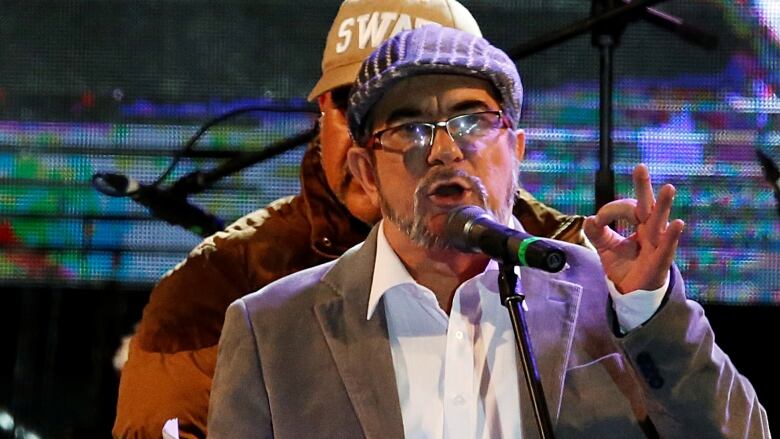FARC leader Timochenko to run for president in Colombia
The Marxist FARC are running a partial slate of candidates in 2018 in transition to party status

Veteran FARC leader Rodrigo Londono known as Timochenkowill run for the presidency of Colombia next year, with the backing of former FARC rebels, the group's new political party said on Wednesday.
However, he and other ex-commanders will likely face human rights criminal trials, and it is unclear how they would serve in office if convicted and sentenced.
The Marxist FARC demobilized under a peace deal with the government last year, ending more than five decades of war. They are now the Revolutionary Alternative Common Force party, still referring to themselves by the Spanish initials FARC.
The party is guaranteed 10 seats in Congress through 2026 by the accord, regardless of its success in elections. Among senate candidates will be former guerrilla commanders Ivan Marquez, Pablo Catatumbo, Carlos Antonio Lozada and Victoria Sandino, the FARC said on Wednesday.
The party will also run candidates for the lower house in five districts.
The group reiterated its willingness to forming a coalition with other leftist parties, a tacit acknowledgement it may have little electoral pull among skeptical Colombians.
"We manifest our willingness to hold talks with all social political groups and movements to make united lists," the FARC said in a statement.
Londono suffered a stroke this year and has received treatment in Cuba.
Security, coca crop growing still concerns
It remains unclear how the FARC members would complete their terms if they are tried or sentenced by transitional justice tribunals tasked with bringing former rebels to justice for crimes like murder, kidnapping and rape.
The maximum sentence the tribunals can hand out is eight years and those convicted will avoid traditional jails, instead doing reparations work like removing land mines.

In a Wednesday press conference, the FARC leaders did not clarify how they would serve possible sentences while holding elected positions. More than 11,000 FARC fighters and supporters handed over their weapons to the United Nations during demobilization.
Another 1,000 refused to lay down their arms and continue to operate lucrative drug trafficking and illegal mining operations. The FARC has sought to distance itself from the dissidents and the government has authorized air raids against them.
Security does however remain on the minds of many voters, especially after farmers were killed in a confrontation with police last month.
There is a crowded field for 2018's presidential race, which looks set to focus more on issues like the economy and corruption than on implementation of the deal, the cornerstone of current President Juan Manuel Santos's legacy.
Santos, who won the 2016 Nobel Peace Prize for helping broker the historic pact, admitted to CBC News in an interview earlier this week FARC's transition is a process that "is hard to digest" for many.
"That's what peace processes are about changing bullets for votes. Instead of killing, going to Congress and making your arguments," he said.
"You have to, in a way, accept those issues if you want peace. Otherwise, those issues will go on forever."












_(720p).jpg)


 OFFICIAL HD MUSIC VIDEO.jpg)
.jpg)



























































































